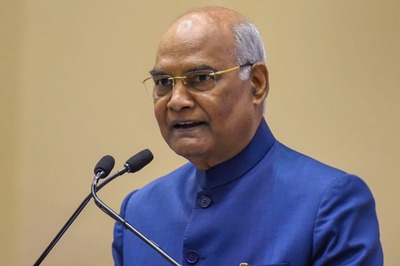
views
New Delhi: Amid heightened tensions between India and Pakistan over Pulwama attack, the International Court of Justice will begin the final round of hearing in Khulbhushan Jadhav’s case from Monday.
Jadhav, 47, was sentenced to death by a Pakistani military court on charges of spying in April 2017.
India moved the ICJ in May the same year against the verdict. The world court had halted his execution on India’s appeal, pending the final verdict by it.
A day ahead of the hearing, Pakistan slammed India for not accepting that Jadhav was in Pakistan to “perpetrate violence”.
In a statement, the neighbouring country’s Foreign Office (FO) said that India blaming Pakistan for the Pulwama attack, was a part of its “well-rehearsed tactics from playbook, which they resort to after such incidents”.
“These are knee-jerk and pre-conceived accusations. India needs to introspect and respond to questions about its security and intelligence lapses,” a spokesperson said.
While Pakistan claims Jadhav was arrested from Balochistan province on March 3, 2016, after he reportedly entered from Iran and has confessed to his intent of spying and carrying out sabotage activities, India denies the charge.
The Pakistan Foreign Ministry further said that Jaish-e-Mohammad, which India says “has claimed responsibility for the attack”, was banned by the country in 2002 and Islamabad was fulfilling its obligations on sanctions as per the law.
In a major diplomatic offensive against Islamabad after the attack, India has highlighted Pakistan's role in using terrorism as an instrument of state policy.
India has slammed Pakistan for stating that it had no role in the Pulwama attack carried out by Pakistan-based terror group JeM, saying Islamabad could not claim that it was unaware of the presence of terror groups on its soil as the links of such outfits to the country were there for everyone to see.
But Foreign Office spokesperson Mohammad Faisal rejected India's allegation that Pakistan was behind the attack. "JeM remains a proscribed entity in Pakistan since 2002 and Pakistan is implementing its obligations on sanctions implementation," he said.
Faisal said on the one hand, India accepted the unverified social media content as "gold standard" but was not ready to accept the "confessions" by its national Kulbhushan Jadhav for perpetrating violence in Pakistan.
Pakistan desired normalisation of relations with India and in his letter to Prime Minister Narendra Modi, Prime Minister Imran Khan followed his intention of taking two steps if India takes one, with the proposal for both Foreign Ministers to meet on the sidelines of the UN General Assembly, Faisal said. "It was India which cancelled the meeting on baseless pretexts," he said.




















Comments
0 comment